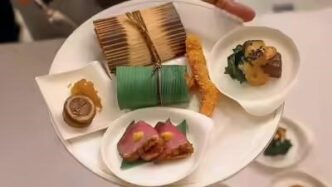Japan is a country where tradition and modernity blend beautifully, and nowhere is this harmony more visible than in its cuisine and culture. From centuries-old tea ceremonies to modern sushi bars, Japan offers a sensory journey that delights visitors from around the world.
A Taste of Tradition
Japanese cuisine, known as washoku, is more than just food — it’s an art form that reflects balance, respect for nature, and a deep appreciation for every ingredient. Recognized by UNESCO as an Intangible Cultural Heritage, washoku emphasizes seasonality and freshness.
Dishes like sushi, tempura, ramen, and okonomiyaki have become global favorites, but their roots are deeply tied to Japan’s regional diversity. Each area of Japan offers something unique — from Hokkaido’s seafood to Kyoto’s delicate tofu dishes and Osaka’s street food culture.
Meals in Japan are often simple yet refined, served with an eye for color and presentation. Even a humble bowl of rice or miso soup carries a sense of gratitude and mindfulness — a reflection of Japan’s cultural philosophy of finding beauty in simplicity.
Festivals and Celebrations
Japan’s culture comes alive through its festivals, or matsuri, which take place throughout the year. These events celebrate the changing seasons, local traditions, and community spirit.
In spring, hanami (cherry blossom viewing) turns parks into seas of pink as families and friends gather to enjoy nature’s fleeting beauty. Summer brings lively festivals with fireworks, traditional dances, and food stalls serving favorites like takoyaki (octopus balls) and yakitori (grilled chicken skewers). Autumn celebrates the harvest season, while winter lights up with New Year festivities and stunning illuminations.
The Art of Everyday Life
Japanese culture values precision, respect, and harmony — principles visible in art, architecture, and daily life. From the graceful movements of tea ceremonies to the craftsmanship of kimono making and calligraphy, every cultural practice reflects dedication and mindfulness.
Traditional arts like ikebana (flower arranging), kabuki (classical theater), and sumo wrestling continue to thrive alongside modern pop culture, anime, and fashion — proving Japan’s unique ability to honor its past while embracing the future.
A Global Inspiration
Today, Japanese culture and cuisine inspire millions across the world. From sushi restaurants in New York to tea houses in Paris, Japan’s influence has crossed borders, bringing people closer to its rich heritage.
Celebrating Japanese cuisine and culture is more than enjoying delicious food or stunning art — it’s about understanding a way of life that values balance, respect, and beauty in every moment.
Japan continues to remind the world that culture isn’t just about tradition — it’s about connection, appreciation, and the joy of sharing experiences that bring people together.

















